







Revenue
| Gross Revenue Breakdown (R$ million) |
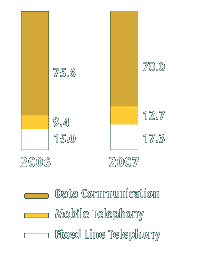 |
| Revenue from Data Communication and Mobile Telephony |
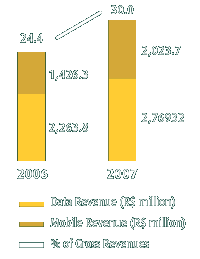 |
Brasil Telecom's gross revenue totaled R$15,997.4 million in 2007, an increase of 5.9% year-on-year. The increase in participation of data communication services and mobile telephony show the success of the Company's revenue diversification strategy.
Fixed line Average Revenue per User (ARPU)-excluding data communication - totaled R$79 in 2007, up 11% from 2006, as a result of the Company's strategy to restrain fixed line revenue erosion. Including data communication, ARPU recorded in 2007 totaled R$98.5, showing continuous growth in ADSL penetration.
Gross revenue from data communication and other services of the main activity reached R$2,769.2 million, an increase of 22.3% year-on-year. This increase is due mainly to the larger ADSL customer base, which posted a growth of 19%.
ADSL recorded an ARPU of R$71.7 in 2007, an increase of 6.9% year-on-year, as a result of its strategy to prioritize the sale of the products with the highest profitability and fastest connection speeds.
Consolidated gross revenue from services with mobile telephony was up 41.9% from 2006. The increase results from the "full bill", and especially from the growth in the mobile base.
The "full bill" model, implemented by ANATEL in early 2006 to regulate interconnections between mobile operators, determines that all calls should be charged. Previously, calls were only charged when the difference between operators' outgoing and incoming traffic was greater than 55%.
Total ARPU for mobile telephony continues to be one of the greatest in the country, at R$34.2 in 2007. Postpaid ARPU was R$52.6, and prepaid ARPU amounted to R$28.5. The improved profitability was also the result of commercial policies where the main advantage offered to Brasil Telecom's customers were discounts in minutes for intranet calls, while outgoing calls to other operators were charged at competitive rates.
OPERATING COSTS AND EXPENSES
In 2007, operating costs and expenses totaled R$7,261.5 million, an increase of 6.7% when compared to the R$6,802.7 million recorded in 2006, due primarily to increases in interconnection expenses (which followed the revenue growth), provisions and losses, and other commercial expenses.
In 2007, personnel costs and expenses amounted to R$648.9 million, a drop of 2.6% year-on-year. By the end of 2007, 16,769 people were employed at Brasil Telecom, 5,287 of whom were employees in the fixed telephony, data, and Internet providers segment; 616 at Brasil Telecom Móvel; and 10,866 became employees of the Company in December, when customer services became an internal area.
Operating Costs and Expenses (Excluding Depreciation and Amortization)
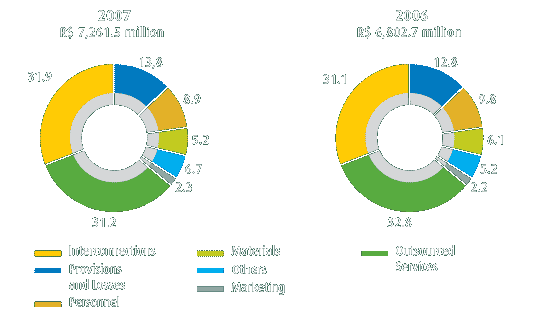
Costs and expenses with outsourced services, excluding interconnection, advertising, and marketing, totaled R$2,268.3 million in 2007, nearly stable as compared to the previous year's figures, reflecting the Company's strategy to control outsourcing expenses. It is worth mentioning the bid opened by Brasil Telecom to choose a single partner for the maintenance of the fixed line, mobile, and data communication networks. This model, the only one in the world on such a scale, will be implemented in early 2008, and aims to explore the scale effects in the operations of the supplier, and, subsequently, to reduce network maintenance costs.
Interconnection costs totaled R$2,318.9 million at the end of 2007, an increase of 9.6%, due to growth in the customer base of mobile operators, and to the integral impact of "full bill", partially offset by the 20% reduction in TU-RL, as of January 1, 2007, and by the increase in Brasil Telecom Móvel's market share.
Advertising and marketing expenses totaled R$164.4 million in 2007, an increase of 10.3% year-on-year, reflecting the focus on advertising expenses for the acquisition of mobile customers. Despite the increase in this item, mobile SAC showed strict control over expenses with subsidies and commissions.
Costs and expenses with materials and goods totaled R$380.2 million in 2007, a reduction of 7.7% year-on-year, reflecting smaller expenses with the Cost of Goods Sold, despite an increase in mobile handset sales.
Losses and provisions for losses with accounts receivable (PCCR) over gross revenue, at the end of 2007, stood at 2.2%, and totaled R$348 million, with a reduction of 9.5%, due to stricter criteria for loan granting and greater billing efficiency.
In 2007, provisions for labor, tax, and civil liabilities amounted to R$650.9 million, an increase of R$162.8 million year-on-year, due primarily to indexation and to the increase in the risk of losses for labor, civil, and tax claims.
Depreciation and amortization costs totaled R$2,470.8 million in 2007, 9.3% below 2006, due to the increase in fully depreciated assets.
Other operating costs and expenses amounted to R$481.9 million in 2007, up 35.5% from 2006. This increase resulted from 2006 non-recurrent expenses, such as R$58.4 million related to state and federal tax recovery, and R$53.1 million in agreements executed with other telephony operators for litigation assignment.

EBITDA
| EBITDA (R$ million) and EBITDA Margin (%) |
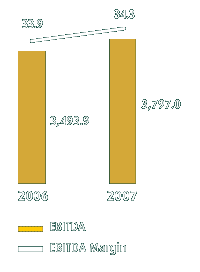 |
Brasil Telecom's consolidated EBITDA totaled R$3,797 million at the end of 2007 (composed of operating profit - R$836.9 million, plus expenses with depreciation and amortization - R$2,470.8 million, and financial expenses, net - R$489.3 million). The consolidated EBITDA margin stood at 34.3% in the period, against 33.9% in 2006.
It is worth mentioning that in 2007, mobile operation started generating positive EBTIDA for Grupo Brasil Telecom. Mobile EBITDA increased from negative R$142.3 million in 2006 (negative 11.4% margin) to R$53.9 million in 2007 (3.1% margin).
The R$53.9 million of mobile EBITDA (negative R$142.3 million in 2006) is composed of operating losses - R$271.4 million (R$511.7 million in 2006), plus expenses with depreciation and amortization - R$385.9 million (R$335 million in 2006), less financial expenses, net - R$60.6 million (R$34.4 million of financial expenses, net, added in 2006).
NET INCOME
Brasil Telecom recorded a net income of R$671.3 million in 2007, equivalent to R$1.8519 per share. Net income per ADR in 2007 amounted to US$9.2594.
| BrT Móvel's EBITDA evolution (R$ million) |
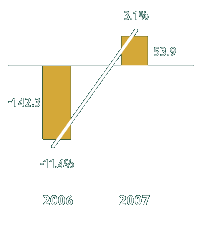 |
INDEBTEDNESS
At the end of 2007, Brasil Telecom's consolidated gross debt totaled R$4,383.4 million, 88.7% of which was allocated to the long-term.
On April 17, 2007, Brasil Telecom S.A. exercised its option of advance redemption set forth in the Deed of the 4th Issue of Debentures, the 3rd Public Issue, as informed to debenture holders on March 28, 2007. A total of R$521.1 million were disbursed to pay for the redemption of all debentures.
Brasil Telecom closed 2007 with a balance of cash and other investments in public and fixed income securities in the amount of R$3,893.5 million, against cash and investments in the amount of R$4,063.4 million at the end of 2006. Consolidated net debt reached R$489.9 million, accounting for 12.9% of EBITDA.
In 2007, debt pegged to exchange rate variation, not taking into account hedge adjustments, totaled R$731.6 million, R$395 million of which was in USD, R$94.7 million in the BNDES currency basket, and R$241.9 million in Yen. In 2007, Brasil Telecom was hedged against 80.6% of the debt pegged to exchange rate variation, resulting in a total exposition of only 3.6% of the total debt.
CAPEX
In 2007, Brasil Telecom's CAPEX totaled R$1,398.8 million, R$1,120.0 million of which were invested in fixed line services (including voice, data, information technology, and regulation), and R$278.8 million in mobile telephony. When compared to 2006, investments posted a reduction of 3.6%, due mainly to the effects of exchange rate variations, reductions in regulatory investments, and a continuous renegotiation with suppliers.

![]()
A DARING PLAN OF OPERATIONAL RESTRUCTURING
Brasil Telecom's future is among the topics that make up the permanent agenda of its meetings with the company's directors. However, for this future to unfold as imagined (or as planned), it requires hard work in the present and the search for new income opportunities, because Brasil Telecom's main business, cable telephony, has limited growth potential. With this in mind, in early 2007 Brasil Telecom outlined a strategy that provided continuity to the work performed in 2006, involved various areas, and relied on the performance of its employees.
Our challenge can only be classified as daring since it entailed promoting a profound restructuring process, whereby Brasil Telecom caused an impact of over R$ 800 million in EBITDA up to the end of the year - this gain did not represent an increase of this magnitude in Brasil Telecom's EBITDA in relation to the R$ 3.5 billion attained in 2006. The forecasts were part of the guidance disclosed by the company on Investors' Day in March 2007, when the amount announced was R$ 3.8 billion.
Our daring approach was characterized by seeking cost reductions and new income opportunities through eleven different measures. These measures included cost reductions in third-party services, personnel, interconnection and fraud, among other initiatives. Another line of attack was a new series of contract renegotiations with suppliers, especially those of the telephone network. It is worth mentioning that this was one of the courses of action undertaken with the arrival of the present administration in 2006, when Brasil Telecom announced the renegotiation of R$ 2 billion in contracts with service providers. Cutting more costs was necessary.
In 2007, the choice of the eleven specific lines of work identified as the most probable to reduce costs and generate revenues was a result of the broad restructuring project conducted one year earlier. During the administration's first twelve months, the directors did not overlook any area of the company: all areas were tackled without exception, solely considering cost reduction, without reducing the quality of the services rendered. The second phase permitted measures of a more "surgical" nature, since they operated in specific processes.
The strategy of creating a new restructuring plan will be continued in 2008, with objectives similar to those of the previous years: cost reduction, increased revenue and, mainly, generation of income for the stockholders and client satisfaction.
![]()